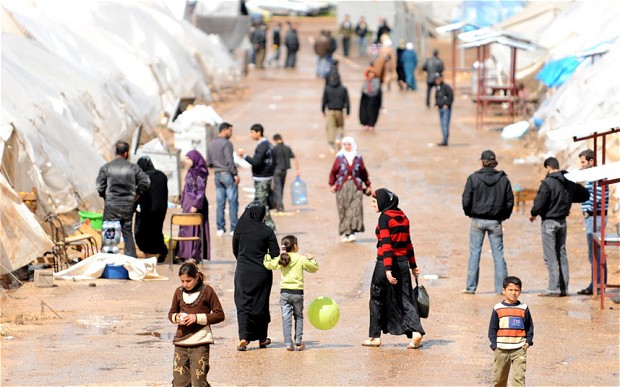
Is There Religious Freedom for Faith-Based Agencies to Welcome the Stranger?
Chelsea Langston
On November 16, 2015, Texas governor Greg Abbott sent a letter to President Barack Obama, stating that the state of Texas was refusing to accept any refugees from Syria. On November 19th, a letter from the executive commissioner of the Texas Health and Human Services Commission was sent to nonprofit organizations in the state providing refugee-related services. The letter orders all organizations involved in this work to inform the commission of any intentions to provide resettlement services to Syrian refugees. Most services for refugees are implemented by contracting with independent organizations, many of which are faith-based. The letter stated: “We reserve the right to refuse to cooperate with any resettlement on any grounds, and, until further notice, will refuse to cooperate with the resettlement of any Syrian refugees in Texas. If you have any active plans to resettle Syrian refugees, please discontinue those plans immediately.”
Several other governors also have expressed concerns about national security regarding the refugee resettlement process. However, state governors do not have the power to refuse acceptance of specific religious or ethnic groups into their states. Texas went one step further. In sending this letter to nonprofits serving refugees via the federal refugee resettlement program, Texas unquestionably violated federal law. Some also believe that the state hindered the capacity of faith-based organizations in Texas to serve in accordance to their deeply held religious convictions.
Effectively, the state is demanding that nonprofit agencies providing resettlement services engage in discrimination that is illegal under federal law. Federal law [8 U.S. Code § 1522 Sec. 5] requires that federally funded refugee services be provided to recipients without regard to “race, religion, nationality, sex or political opinion.” The Texas Health and Human Services Commission’s instructions to nonprofit organizations put them in a difficult position: break federal law or fail to comply with an explicit state guidance. According to an article entitled “The Refugee Issue is a Religious Liberty Issue” if the HHSC’s letter causes litigation, this conflict between federal and state requirements “will probably be the axis on which the arguments unfold. But it’s not the only issue at hand.”
The other issue is religious freedom.
In Texas, many of the agencies that receive contracts to provide refugee services are religious. One of their core religious convictions is to serve all refugees in need. Because of this, some religious agencies in Texas interpreted the HHSC letter not just as a directive to violate federal law, but a directive to violate the core tenets of their faith.
Texas Impact/Texas Interfaith Center for Public Policy is group consisting of Jewish, Christian, and Muslim member organizations and individuals. Texas Impact’s mission is to “advance state public policies that are consistent with universally held social principles of the Abrahamic traditions.” The organization’s board released the following statement: “ We are deeply concerned that the Governor’s letter directs those agencies to interfere with the religious freedom of faith-based humanitarian agencies working in Texas. As we read the Governor’s letter, he appears to be directing state agencies to pressure faith-based organizations to violate the sincerely held beliefs of their religious traditions…..”
It is probably unlikely at this point that these policies will be challenged in court as a violation of the religious freedom of faith-based agencies, because the violation of federal law is more direct and explicit. However, if such a claim was made by a religious refugee resettlement agency, the claim would rest on the question of whether the state’s prevention of these faith-based organizations from providing such services to all refugees was a substantial burden on their exercise of religion. If it was determined that a substantial burden was created by limiting a religious organization’s ability to serve consistent with its faith, the burden would shift to the state to prove that the state had a compelling interest to limit the activities of the FBO and that there were no less restrictive means to achieve this interest.
And there is another concern.
As Elizabeth Bruenig states, “[A] fight over religious freedom could also pit old allies against one another. If Texas has…relied heavily upon the activities of nonprofits to sustain something resembling a network of social programs within the state, then openly infringing upon faith groups’ religious freedom could sour longstanding partnerships, and chill the possibility of forming new ones.”
Right now, the path forward for faith-based organizations serving refugees is unclear. What is true is that faith organizations of many religious backgrounds have expressed that service to displaced persons is a central faith issue for them. The first words the USCCB website uses when addressing the question of Syrian refugees are the words spoken by Christ in Matthew 25:35 “I was a stranger and you welcomed me.”
The questions surrounding the acceptance of Syrian refugees touch on complex matters of national security, humanitarian duty, and even religious freedom. Public policy stakeholders on a local, state, and federal level have a unique opportunity to invite faith groups to the conversation, to utilize them as a vital, on the ground resource in making informed policy decisions. Faith groups, likewise, should come to the table to share their unique knowledge and experiences in working with displaced persons. This is exactly what was proposed by Texas Impact, for faith groups and state officials to come together to collaborate on these complex issues: “We urge the Governor to convene a stakeholder meeting at the earliest opportunity that includes both representatives of all faith-based resettlement agencies active in Texas and their respective religious leadership, so that members of all faith communities have an equal opportunity to engage in the development of emerging state approaches for the resettlement of refugees.”
